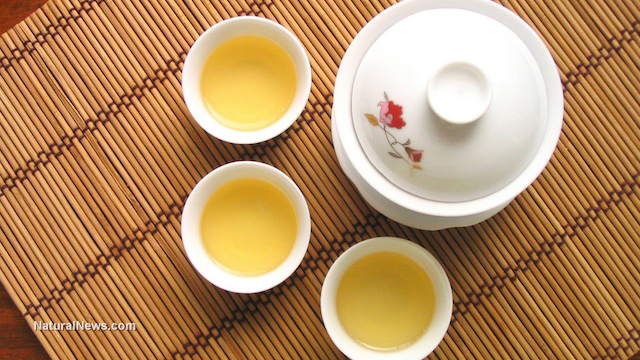Have a cuppa for your heart: Research shows regular tea drinkers maintain better cholesterol levels as they age
04/09/2020 / By Darnel Fernandez

Tea is a widely popular aromatic beverage that is consumed around the world. In fact, the Food and Agriculture Organization of the United Nations (UN) claims that tea is the most widely consumed beverage worldwide, second only to water. But this beverage is more than just a drink to warm you up during cold weather. Tea is also highly appreciated for the plethora of health benefits it provides. For example, research has found that drinking a cuppa every day can bring with it some heart benefits.
Previous studies have established tea’s ability to reduce the risk of heart disease and stroke by decreasing blood levels of low-density lipoprotein or LDL – the so-called “bad” cholesterol that builds up in arteries. However, these studies have not answered how drinking tea affects “good” cholesterol, also known as high-density lipoprotein (HDL), which helps carry LDL away from the arteries.
But a recent study published in the Journal of the American Heart Association revealed that a daily cup of tea can slow down the natural decrease in HDL that is associated with aging.
The connection between drinking tea and maintaining healthy cholesterol levels
For this study, researchers from Pennsylvania State University (PSU) analyzed the relationship between tea consumption and blood HDL levels. They observed more than 80,000 people from the Kaliuan community in Tangshan, China over a six-year period. The researchers found that those who drank tea exhibited significantly slower age-related decreases in HDL levels. They associated this with an eight percent decrease in cardiovascular disease risk.
The researchers also discovered that green tea had a significantly stronger effect on heart health than black tea. This was despite both types of tea containing large amounts of polyphenols and catechins, compounds that are known for their anti-inflammatory properties. (Related: A cup of tea or a handful of berries a day can help prevent heart disease.)
The link between increased tea consumption and the slower decline in HDL levels was observed in all participants, though it was more prominent in men and in those aged 60 and above who smoked, were obese or lived a sedentary lifestyle.
“We still observed a significant association in these people, which suggests that the observed association cannot be totally interpreted by someone’s overall healthy lifestyle,” said senior author Xiang Gao, who is also the director of the Nutritional Epidemiology Lab at PSU.
But the study had several limitations. The researchers’ findings were mostly based on self-reported information about general tea consumption (either monthly or weekly). The study also did not include dietary information like the consumption of meat, whole grains, fruits and vegetables. Furthermore, the study exclusively analyzed people from a particular Chinese community who don’t necessarily represent the nation’s entire population.
According to Judith Wylie-Rosett, a professor at New York’s Albert Einstein College of Medicine, the study took “a cautious approach to endorsing the benefits” of drinking tea while analyzing its impact on HDL levels.
“We don’t tend to talk much about the decline in HDL cholesterol with age, and our main lifestyle strategies for trying to increase it are vigorous physical activity and losing weight,” she added. It’s nice to know that other lifestyle choices can help support these efforts.
Learn more about the health benefits of drinking tea at Superfoods.news.
Sources include:
Submit a correction >>
Tagged Under:
black tea, cardiovascular disease, catechins, food cures, food is medicine, functional food, Green tea, heart health, high-density lipoproteins, low-density lipoproteins, natural cures, natural medicine, phytonutrients, polyphenols, research
This article may contain statements that reflect the opinion of the author
RECENT NEWS & ARTICLES
COPYRIGHT © 2017 FOOD SCIENCE NEWS



















